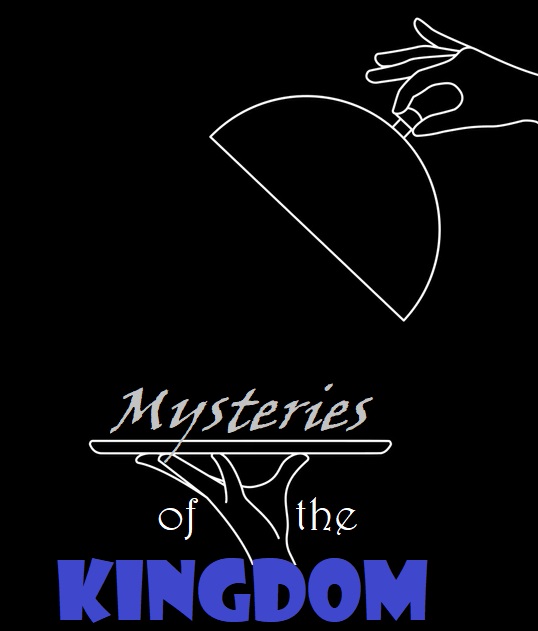Mysteries of the Kingdom
By Anthony Casperson
5-24-25
Good and lasting art, in my opinion, is both pretty and poignant. It has an aesthetic beauty and a message.
That latter part doesn’t mean that the artist/author must whack people over the head with their philosophical or political leanings. Rather, what it means is that the artist has a perspective on a particular aspect of their culture and would like to invite the audience to witness it from that direction. The art intends to explain, clarify, and help others shift perspective, not beat them into submission until they finally surrender.
It’s more the idea of, “Let’s take a look at the ramifications of this action. And once realizing the negative results of it, change to this other method.” And less, “You’re a worthless idiot if you don’t see things my way.”
The point of art is speak to the audience about cultural areas that the artist views as important. Areas to congratulate, to question, or to modify.
However, sometimes, the artist portrays their message in a manner that’s not easily understood by those who don’t have the proper frame of reference. Or, because they speak against the status quo of the culture around them, the artist gives their message with multiple levels of meaning. And only those who are in the know can understand the deeper meaning.
Sometimes, a timeless story supposedly about star-crossed lovers is actually a scathing indictment about political rivalries so stupidly held that they’re killing the next generation. (But how could anyone really miss that point? Right?)
As we begin this year’s summer blog series—yes, I know it’s a little early this year—we’re going to take a look at some stories by one artist who intentionally uses multiple levels of meaning. His point is to make things unclear for those who blind themselves to the truth he speaks. Obfuscate the message for them, even as he calls those on the inside to dive deeper.
Both sides witness the same mystery. But because of which side we’re on, one group understands how it all works while the other remains confounded. (And the fact of the matter is that even some individuals “on the inside” throughout the millennia have gotten his message wrong with a story or two. Or ten.)
For those who haven’t guessed, the artist I’m talking about is Jesus. And it’s several of his parables found in the gospels that we’ll be looking at.
But some of you might be asking why Jesus would intentionally push people away from his message? How could the God-man who loves us so much that he died for us want to confuse and confound anybody? Shouldn’t he want all people to understand the message of his stories? If his stories lead to life, and he wants to bring life to all people, then shouldn’t he want everybody to understand the stories?
Well, the answer to that is actually found in the middle of one of his more famous parables. So, we’ll pull that section out, and leave the rest of that parable for next time.
The passage in question can be found in Matthew 13:10-17. (Mark 4:10-12 and Luke 8:9-10 also offer the same event, but the Matthew passage gives the fuller explanation.) Here, we see the disciples come to Jesus after one of his stories and they ask him why he speaks in parables. Why tell artistic stories that can have a confusing message?
To this, Jesus points out that there are two types of people when it comes to his parables. Those to whom God provides the mysteries of the kingdom. And those to whom they are not given.
In this case, the word “mystery” doesn’t mean an unknown thing. Rather, it’s something that once had been hidden, but now is revealed. Not a closed box with millions of possibilities contained within, but instead, a box opened and revealed with completely satisfying contents that can be used practically.
Thus, there are some who have been given the mystery box’s contents so that they can study and test and understand them. All the while, others stand afar off, ooh-ing and ahh-ing. Or possibly walking away, because they don’t understand the value of the whole thing. (Because unrevealed mysteries are exasperating, at best.)
Many of us today would want to chase after the latter group. We’d want to keep on explaining and giving greater details to those who were confused. All in the name of no one being left behind. But this is because such individuals fail to—or refuse to—understand something about humanity that Jesus does understand.
Some people choose to turn from the revelation. They blind themselves to the truth.
In verse 14, Jesus says that with such people, the words of Isaiah are fulfilled. They hear, but don’t understand. They see, but don’t perceive. It’s like they chose to never learn the local language. Or they turn away from whatever you’re pointing at. They have a will that refuses to accept the message of God.
They’ve built up a thick wall around their heart so that no call for change can break through. They’ve intentionally stopped up their ears so that they can’t hear a thing. They’ve shut their eyes right when truth was about to be revealed, preferring the darkness of ignorance over the reality of truth.
It’s not that Jesus desires for anybody to be left in the dark. Rather, such individuals chose it by refusing to be in on the mystery. They chose to refuse God’s gift of revelation.
On the other hand, those who have received God’s gift are called blessed. We’ve become recipients of divine favor. We’re the fortunate ones who happened to draw closer to his truth. Opened our hearts to him when he called. Leaned in to listen, and heeded his words and warnings. Watched and waited for the moment of reveal.
And because we’ve accepted his blessing, we are invited deeper into the mystery of the Kingdom of God.
But this means that as we take this summer to hear the parables of Jesus, we must continue to remain open to the message he has for us. To open our hearts, ears, and eyes toward his truth. And let the contents provide us with the way we should live in the here and now.
One important thing for us to understand as we hear his parables is that they all have a message that should draw us closer to the Kingdom of God. The mysteries he reveals to his people through the stories teach us about the ways and manners of those who belong to his kingdom. And even though we live in the “now, but not yet” of that kingdom, our perspective should be to live out the ethics of his kingdom that he reveals through the parables. Live them out in our everyday lives. Right now.
So, let’s get ready to be called to good, but difficult, things. Actions and attitudes that go against our culture so much that most would refuse to accept them.
Let’s open our eyes to the mysteries of the kingdom. And let the words of Jesus’ parables change us to be ever closer to the people his kingdom calls us to be.



